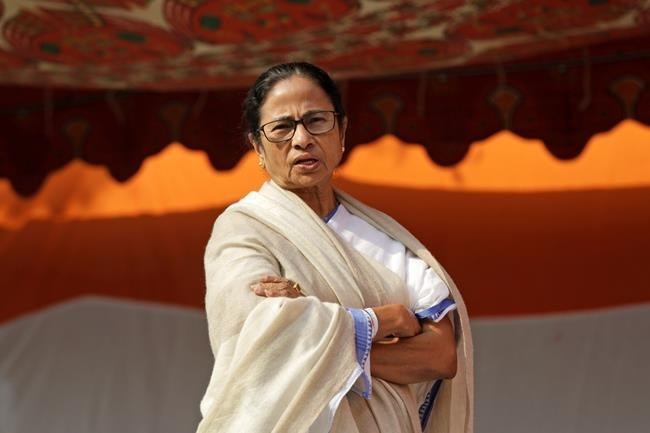
In this Feb. 4, 2019 photo, Chief Minister of West Bengal state Mamata Banerjee attends a protest in Kolkata, India. India’s Prime Minister Narendra Modi has taken his Bharatiya Janata Party’s fight to the state of West Bengal, where it hopes to retain a majority in staggered general elections concluding May 19 by diluting the strength of a formidable opponent, chief minister Mamata Banerjee. (AP Photo/Bikas Das)
Republished May 17, 2019 - 4:23 AM
Original Publication Date May 17, 2019 - 3:06 AM
KOLKATA, India - Indian Prime Minister Narendra Modi has taken his ruling party's fight to the state of West Bengal, where it hopes to retain a majority in staggered general elections concluding this week by diluting the strength of a formidable opponent, Chief Minister Mamata Banerjee.
The battle pitting the Bharatiya Janata Party's Hindu nationalism against Banerjee's Trinamool Congress Party's big-tent politics has come to a head in the state, which stretches from the Himalayas in the north to the Bay of Bengal in the south and shares a language and border with Muslim-majority Bangladesh.
That border is another battleground: the BJP has backed a bill that would make it easier to deport millions of Bangladeshis who migrated to India since Bangladesh's 1971 independence while easing a path to citizenship for Hindus, Sikhs, Parsees and Jains — conspicuously non-Muslim — who arrived from Afghanistan, Bangladesh and Pakistan. Banerjee, the state's top elected official, has called the bill a "conspiracy" to make more people stateless refugees.
While Modi has made divisive veiled references to India's Muslim community, which comprises about 14% of India's 1.3 billion people, Banerjee studied Islamic history, quotes the Qur’an and successfully backed a Muslim candidate for mayor of Kolkata, the state's capital.
Banerjee in 2011 unseated nearly three decades of communist party rule in West Bengal, a state of 100 million people, a quarter of whom are Muslim, and eyes a chance to go to New Delhi as the opposition's candidate for prime minister.
"Mamata Banerjee has a vital spot. She has really taken Modi head-to-head despite Modi's strong standing nationally," said Himanshu Roy, a political science professor and senior fellow at the New Delhi-based Nehru Memorial Museum and Library.
"She is very fierce against Modi. She ousted the leftists in the state and is now using the same tactic to keep Modi away from any major success in this election," he said.
At the national level, Modi's primary rival is Congress party President Rahul Gandhi, the scion of the Nehru-Gandhi dynasty that has produced three prime ministers.
With 900 million registered voters, the election is the world's largest democratic exercise. Over the seven phases of voting staggered over six weeks, 543 seats in the Lok Sahba, India's lower house of Parliament, will be decided at about a million polling stations. A party needs 272 seats — a simple majority — to form a government. The BJP won 282 seats in 2014, but appears unlikely to win as many in these elections. It is aiming for at least 200 seats this time with regional parties making up the balance, according to Modi biographer and political commentator Nilanjan Mukhopadhyay.
Banerjee could find herself playing the role of kingmaker, he said.
"There is a very distinct possibility for Mamata if she holds onto Bengal," he said, adding that she could also temper Modi's move toward the right.
Under Modi, cow vigilantes, in the name of protecting Hinduism's sacred symbol, have attacked more than 280 people and lynched three dozen Muslims for consuming beef or working in slaughterhouses, Human Rights Watch said in a recent report.
After BJP defeats last year to the Congress party in state assembly elections in key places including Madhya Pradesh, Rajasthan and Chhattishgarh, the party shifted its focus to the east. The BJP is hoping to shore up its losses in the so-called Hindi heartland by increasing its standing in West Bengal.
The contest there intensified in the lead-up to the final phase of India's marathon elections, with rival groups fighting with sticks and rocks and setting vehicles on fire, prompting the Election Commission to take the unprecedented step of curtailing campaigning by a day to avoid any further clashes that could undermine Sunday's polls.
Exchanging epithets with increasing vitriol, Modi has called Banerjee, 68, a "speed-breaker," accusing her of slowing the central government's development projects. She has called him a "fascist" and expressed a desire to seal his mouth with surgical tape for "telling lies."
The TMC won 34 of 42 seats up for grabs in West Bengal in the 2014 elections while the BJP picked up only two. But the ruling party is making headway in the state by uniting voters opposed to Banerjee, according to Sanjay Kumar, a political scientist at the New Delhi-based Centre for the Study of Developing Societies.
"Anti-Mamata votes have crystallized the force of the BJP in West Bengal," Kumar said.
Banerjee has an edge with minority voters, who, according to Kumar, BJP found it didn't need in the 2014 elections and whose votes it hasn't tried to mobilize five years later.
Mohammed Quamruzzaman, president of the All Bengal Minority Youth Federation, said Muslims are experiencing an existential crisis in India.
"We don't want development of our community anymore, we don't press for education for our children anymore, our main concern is safety and security of our people," he said. "We are worried about our survival. Everything has changed for us over the last five years."
___
Schmall reported from New Delhi.
News from © The Associated Press, 2019